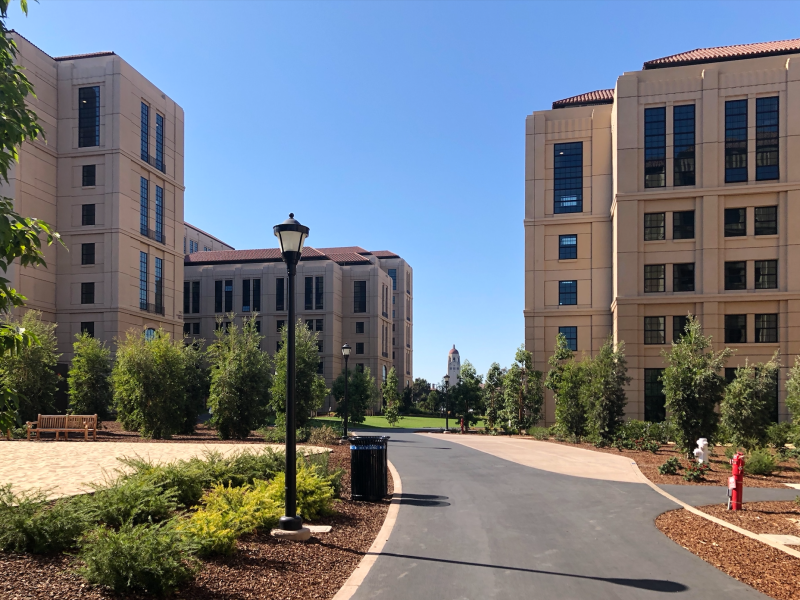The Graduate Student Council (GSC) passed two resolutions — one recommending improved academic accommodations for student-athletes and another seeking to expand Stanford’s airport shuttle services — at its Tuesday meeting. The council also heard updates on an upcoming campus sexual misconduct survey.
Campus sexual misconduct survey
Brian Cook, senior director of assessment and evaluation at Stanford Institutional Research & Decision Support (IR&DS), shared updates on the Higher Education Sexual Misconduct and Awareness (HESMA) survey, which will be administered by external research firm Westat. The survey will be open to undergraduate and graduate students from April 30 to May 30, with the final report released in October.
The University announced it would participate in the survey alongside nine other U.S. universities in a Stanford News report last fall. The results will be used to understand the current state of sexual misconduct on campus and inform future policies, according to the report.
Around 62% of Stanford students participated in a previous version of the survey in 2019. Co-chair Emmit Pert, a fourth-year chemistry Ph.D. student, asked Cook during the meeting if the University made policy changes in response to the 2019 survey results.
Cook said that people in the Title IX office used the data “pretty extensively” and that Title IX underwent “big changes” following the survey. Cook said it is unclear how many of those changes were due to the survey, “but clearly it played a role.”
Stanford updated its Title IX policies and procedures in 2020, though the changes were intended to comply with federal regulations put forth by the U.S. Department of Education that May.
Cook said the 2019 survey did, however, spark substantial conversation about sexual misconduct on campus. Cook added that while the campus climate is different now, the upcoming survey may prompt similar conversations.
“I think there are a lot of questions around what’s going on at Stanford now in the post-pandemic era,” Cook said.
Cook said IR&DS is eager to work with community groups to support a successful rollout of the survey. The HESMA survey “matters the most for our campus in this space, in terms of data collection effort,” Cook said. “We know just how high a proportion of students on our campus have experienced these issues.”
Academic accommodations for student-athletes
The GSC voted 9-1 to pass a resolution suggesting improved academic accommodations for student-athletes following a lengthy discussion during the meeting.
The resolution was introduced by Undergraduate Senate (UGS) co-chair Diego Kagurabadza ’25 at the Jan. 9 UGS meeting and debated across multiple subsequent student government meetings. It calls on the University to implement priority enrollment for student-athletes by class year in courses “necessary for degree completion,” excluding activity courses. Other clauses include calls for improved missed-class accommodations, such as alternative exam dates and recorded lectures.
Kagurabadza reiterated at Tuesday’s GSC meeting that the resolution is intended to support student-athletes through any academic disruptions, such as longer travel times, that result from Stanford’s move to the Atlantic Coast Conference.
Councilors expressed reservations regarding the resolution’s priority enrollment clause. Co-social chair Kavya Sreedhar, a fifth-year electrical engineering Ph.D. student, said she would like to see data supporting its necessity, adding that many students — not just athletes — face scheduling constraints.
First-year MBA student and Graduate School of Business representative Chris West questioned why the resolution did not restrict priority enrollment to courses that count toward the student-athlete’s major.
Kagurabadza responded that the students working on the resolution were “hoping to leave it as broad as possible, and then work out some of those finer details with faculty and administration.”
Co-chair Emmit Pert said “the most important thing is having uniform rules that are well-understood by everyone” when it comes to accommodations for athletes.
The UGS also voted to pass the resolution Tuesday evening.
Airport shuttle service expansion
The GSC voted 9-0 to pass a resolution calling for expanded institutional airport shuttle services.
The resolution calls on the University to sponsor free shuttles to local airports during students’ peak travel seasons, like around school breaks. It cites affordability and sustainability as motivation for expanding the services.
Students currently have the option of using ride-sharing services to get to the airport, but those services can be expensive, the resolution states. The Caltrain is a cheaper but potentially hard-to-navigate option for students unfamiliar with Bay Area public transit, according to the resolution.
The resolution noted that group shuttle rides would be more eco-friendly than ride-sharing, in line with the University’s stated commitment to reducing carbon emissions.
